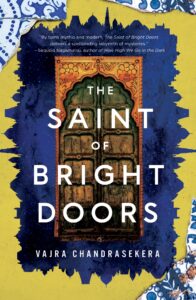
I’ve read a little bit of Vajra Chandrasekera’s short fiction, and I’ve been consistently impressed with his prose and creativity, but just as consistently finding myself at the end wanting a little bit more. So I decided to skip his debut novel, The Saint of Bright Doors, only circling back around when it surprised me by landing on the Hugo Award shortlist for Best Novel.
The Saint of Bright Doors absolutely continues the trend of beauty and creativity and being driven by something other than plot. It takes place in a secondary world analogue of the Indian Subcontinent, featuring a main character whose mother raises him to kill his absent father, a high-profile religious leader known as The Perfect and Kind. But rather than seize his destiny, the lead travels to a multicultural city with both robust social services and a tyrannical government upholding a strict racial caste system. There he joins a support group for other almost-chosen ones, studies the mysterious bright doors dotting the city, and eventually finds himself confronting that same destiny he’d tried to escape.
While there’s a lot going on from a plot perspective, this book is much more about the prose and the themes than it is the plot, or even the characters. It’s gorgeously told, though in a way that tends to keep the reader at an emotional arm’s length from the lead. And the themes of racial discrimination and religious violence are expertly portrayed, starkly enough that it’s hard to imagine any reader missing them, but blended into the story in such a way that it never feels overly didactic. And for those more familiar with the novel’s cultural context—as I am not—there’s a whole new layer of depth, with characters drawn deliberately to echo major figures within the history of Buddhism and loads of pointed commentary on violence by an allegedly peaceful religious leadership in Sri Lanka. I am assured that this is evident to those familiar with Sri Lankan politics, and while I didn’t catch the real-world parallels at all, it does give me a deeper appreciation of the novel.
Beyond the prose and themes, some of my favorite elements came when the lead was trying to flee his destiny. The support group was compelling, his endeavors to help new immigrants were endearing, and the bright doors made for a fascinating and delightfully weird mystery to keep reader interest high. But most of these elements are relegated to mere subplot as The Perfect and Kind forces himself back into the lead’s world. Not only does this relegate some fascinating story elements to the sidelines, it increases the emotional distance between the reader and the lead. And there are moments where the storytelling intentionally increases that distance, but a lot of it just stems from him shifting focus away from what had been his priorities early in the book and throwing himself into the very thing he’d been trying to avoid. Perhaps the novel is trying to say something about destiny (though the messages here are sufficiently mixed that I find this doubtful), or (perhaps more likely) something about ignoring the elephant in the room, but it’s done in a way that makes the actions feel impulsive and out of step with the character as presented up to that point. There are certainly still some satisfying resolutions to some of the prior plot developments—the bright doors, for instance, don’t go away—but the way early priorities fade as the main plot takes off makes the plot feel scattered and the main character distant.
Even with the plot not being a strength, I did find that the thematic elements gave The Saint of Bright Doors a clearer focus than some of his short fiction, and the more I understand the social commentary, the more impressed I am by it. For readers who enjoy prose and theme and are less focused on plot and character, I wouldn’t be surprised to see this as a true favorite. For me, it was more of a mixed bag, but one with sufficient strengths that I came away with an overall positive impression, even if I wasn’t as wowed as some other Hugo voters.
Recommended if you like: prose and theme over plot and character, Sri Lankan social commentary.
Can I use it for Bingo? It’s hard mode for Author of Color, and it also is a Book Club selection, features Dreams, and is a candidate for Judging a Book by its Cover.
Overall rating: 15 of Tar Vol’s 20. Four stars on Goodreads.
